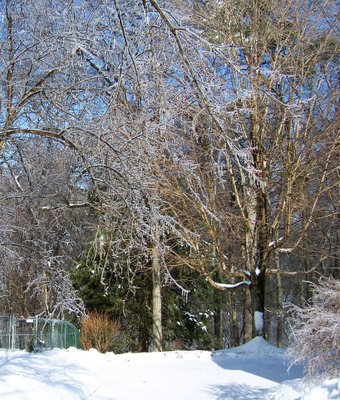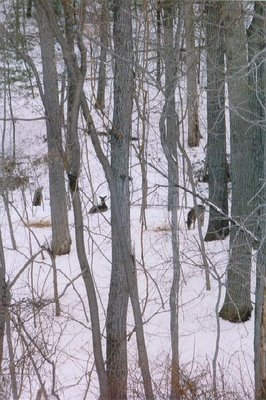A new semester at LSU.
The beginning of a new semester is always hectic--lots of paperwork to feed the bureaucracy, lots of planning for my own academic endeavors, lots of preparation for teaching. Still, I'm done with coursework as of last fall, and I haven't yet begun to prepare for the general exams I'll be taking in a few weeks.
For right now, all I have to do at LSU is teach--something I love to do. Not only do I like teaching for all the conventional reasons, but also because it's an escape for me. When I'm doing my thing in the classroom, everything else fades into the background. I'm there, I'm focused on interacting with my students, and I'm concentrating on what my students need and what I need to do to deliver it. As those of you who've been in the classroom as a teacher know well, this often involves a lot of backtracking and sidetracking, frequent changes of plans, and quick thinking. Today, in my second Performance of Literature class, this process led me to do something I'd practically vowed not to do in the classroom.
From a pedagogical point of view, I never saw the value in revealing my sexual orientation to my students. If it doesn't create a "teachable moment," my thinking went, there's no reason to bring it into the class. Aside from that, I believe that in most of life's circumstances, a person's orientation is of negligible importance. In this case, however, I found a different reason to come out to my students--an incidental one.
I was introducing the concept of blending performance with literature to the class. As an example, I pulled Frost's "Stopping By Woods On A Snowy Evening" out of the air. For reference (and because I've always loved the poem):
Whose woods these are I think I know.I talked about the most common analytical interpretation of the poem--that it provides a metaphor for the contemplation of suicide. Then I discussed my personal interpretive preference for the poem--a literal reading built around what I think are simple, beautiful images of passing near a quiet, snowy forest at night, and the fleeting sense of Taoist solitude that I find in Frost's words. I encouraged the class to contemplate how these two interpretations might alter an individual's performance of the poem.
His house is in the village though;
He will not see me stopping here
To watch his woods fill up with snow.
My little horse must think it queer
To stop without a farmhouse near
Between the woods and frozen lake
The darkest evening of the year.
He gives his harness bells a shake
To ask if there is some mistake.
The only other sound's the sweep
Of easy wind and downy flake.
The woods are lovely, dark and deep.
But I have promises to keep,
And miles to go before I sleep,
And miles to go before I sleep.
Several students got hung up on how one might go about performing an interpretation like the second one without using sign language or playing charades with the audience. I told them that the core of such a performance would need to be grounded in personal memory and experience. "Like....what?" one student asked, frowning.
Now, hypotheticals aren't my style. I tend to prepare extensively and then provide lecture examples on the fly, and I've grown accustomed to responding to questions that way. The first thought that came to my mind as I groped for examples of what I might use to create the physical aspects of a performance of "Woods" was...the stand of trees behind Bob's house in Massachusetts.

Behind Bob's house, there's a dell filled with beautiful trees. You can see it from his kitchen window, and I once told Bob that I would love to be there in the winter to see the snow falling through the branches. Some months later, in the winter when I was back home in Baton Rouge, Bob aimed his web cam at the dell so that I could see the snow fall. I played George Winston's December album while I watched the snow at my computer. I've still never seen snow like that in person, and I can only imagine the sound and the feeling of being in such a place with the snow. Maybe it's better in my imagination than it would be in reality, but that's beside the point--the image in my mind fits perfectly with the grandeur, melancholy, seclusion, passivity, and engagement I feel in Frost's poem.

I wanted to tell my students all this, to use it as a concrete example of a personal experience that I might use as a starting point for developing a performance. The example came to me as a narrative, and it never occurred to me to present it in any other fashion. After a quick inner debate, I mentally slapped myself on the wrist for hesitating and told the class the story. Beginning with "My ex-fiance Bob has a stand of trees just beyond his backyard...." I went on to tell them about looking at the trees while making jambalaya for our supper, and about how Bob aimed his web cam at the trees in winter for me. I talked about the significance of this memory, and about why I link it to the images in "Woods". And then, of course, I went on with the lesson. (Side note: Putting "ex-" in front of anything referencing Bob still bugs me, but I can't seem to find an accurate and workable solution to this vexation.)
Afterward I wondered what, if anything, my class thought about this whole episode. I've become accustomed to surprise and even shock as reactions when I come out, so it felt strange to do it in a situation in which the listeners might feel constrained to limit their responses.
To be honest, I'm not even sure why this feels important enough to write about. And yet, I'm fairly sure that it is important. I'm also fairly sure that now that I've done it once, I'll want to do it again--pedagogical theory be damned. I don't know why that is, either. But for right now, I'm content to just let it be.

